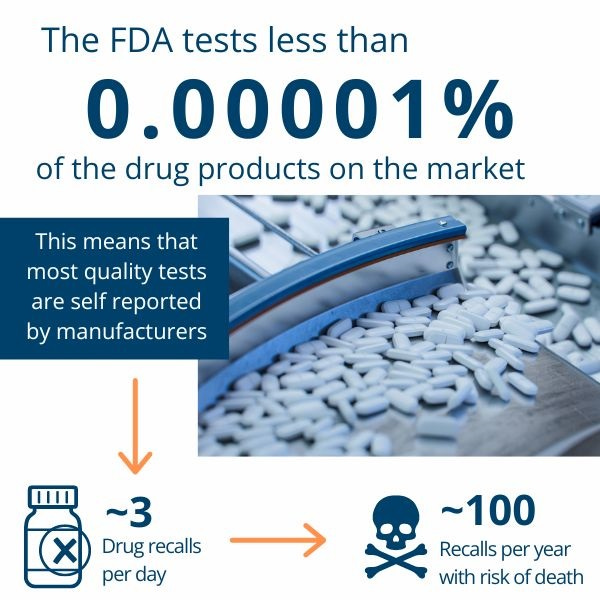Drug Quality Testing Project
Have you ever switched from a brand name drug to a generic, or switched between generics, and found that the new drug didn't work as well or brought on new side effects?
Sometimes, drug quality is the reason for bad side effects, and only laboratory testing can pinpoint the specific quality problem. But the FDA does not require routine testing of drugs entering the U.S. Inadequate inspections of overseas manufacturing facilities have also contributed to drug safety problems. In fact, Bloomberg News reports that recalls related to drug manufacturing quality doubled in the US from 2018 to 2022.
Recently, independent drug testing company Valisure (New Haven, Connecticut) was awarded a contract with the U.S. Defense Department (DoD) to do medication quality testing. Along with multiple study partners, they are launching the Pharmaceutical Quality Risk Assessment Study to independently study the quality of generic drugs in the United States and create a “Red/Yellow/Green” rating system to help industry purchasers and patients avoid products with concerning results.
If you or someone you know has had an issue with a generic drug, please consider submitting it as a suggested drug to be included in the Pharmaceutical Quality Risk Assessment Study. You may submit more than one suggestion, but please fill out a separate form for each drug, along with the reasons you are recommending that the drug be tested. Find the link to the short survey here (click the blue “Vote” button on the page):
https://www.valisure.com/valisure-newsroom/vote-participate-in-the-largest-independent-pharmaceutical-quality-study

For an explanation of ingredient concentration variations, check out the Ask a Patient explainer on generics ingredients "Generic Drugs: Ingredients and Quality Concerns.”
Drug Safety Labeling Updates
Jazz Pharma's epilepsy drug Epidiolex (cannabidiol, a cannabinoid drug) had a safety label update to report post marketing cases of liver injury and liver enzyme elevations. Cases of elevated ammonia levels occurred in some patients who reported concomitant use of seizure drugs valproate, clobazam, or both.
https://www.accessdata.fda.gov/scripts/cder/safetylabelingchanges/index.cfm?event=searchdetail.page&DrugNameID=2298
Novo Nordisk's weight loss drug Wegovy (semaglutide) had its safety label updated with clinical trials data for geriatric patients. In the cardiovascular outcomes trial, patients age 75 years and older reported more fractures of the hip and pelvis on WEGOVY than on placebo.
https://www.accessdata.fda.gov/scripts/cder/safetylabelingchanges/index.cfm?event=searchdetail.page&DrugNameID=2711
Wegovy patient reviews on AskaPatient website
Genentech's flu drug Xofluza (baloxavir marboxil in liquid and tablet form) had its safety label updated to include pediatric (age 5 – 11) clinical trials results for patients at high risk of developing flu complications. The FDA approved the expanded use of the drug for these high risk patients. The most frequently reported adverse events for XOFLUZA treatment arm were vomiting (5%) and diarrhea (5%). Vomiting was reported in more patients who took oseltamivir (Tamiflu brand name), with 18% of subjects experiencing the side effect. The label notes that there are limited safety data in patients 5 to <12 years at high risk of developing influenza complications, as only 15 patients in this category were included in the study.
https://www.accessdata.fda.gov/scripts/cder/safetylabelingchanges/index.cfm?event=searchdetail.page&DrugNameID=2087
Xofluza and Tamiflu patient reviews on AskaPatient website
Motion sickness drug skin patch Transderm Scop (scopolamine) had a safety label update to warn of the risk of psychiatric adverse reactions. Patients with this experience are advised to remove the patch at once and seek medical attention if severe symptoms persist. Also, because of the risk of blurred vision if the product comes in contact with the eyes, patients are advised to not touch the system while wearing it, and wash hands and the application site with soap and water after transdermal system removal.
https://www.accessdata.fda.gov/scripts/cder/safetylabelingchanges/index.cfm?event=searchdetail.page&DrugNameID=1887
Transderm Scop patch reviews at AskaPatient website
Benzene in Acne Products
Independent lab Valisure tested various acne products containing benzoyl peroxide, and found the carcinogen benzene in the products when they were subjected to "stability testing." Unlike Valisure's previous findings of benzene in sunscreens, hand sanitizers and other consumer products where the benzene came from contaminated raw materials, the benzene in benzoyl peroxide products come from the drug itself degrading into benzene. Valisure is asking the FDA to consider a market withdrawal.
https://fortune.com/well/2024/03/06/popular-acne-products-from-proactiv-clinique-and-target-contain-cancer-linked-chemical-benzene/
Readers, please note: the regular edition of Drugs & Treatments News will be sent tomorrow, March 18.
